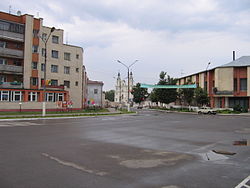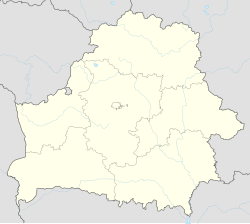Ivyanets
| Ivianec Івянец |
||
|---|---|---|
 |
||
|
||
| Coordinates: 53°53′24″N 26°44′49″E / 53.89000°N 26.74694°ECoordinates: 53°53′24″N 26°44′49″E / 53.89000°N 26.74694°E | ||
| Country | ||
| Voblast | Minsk | |
| Raion | Valozhyn | |
| First mentioned | XIV century | |
| Established | 1940 | |
| Population (2009) | ||
| • Total | 4 800 | |
| Time zone | EET (UTC+2) | |
| • Summer (DST) | EEST (UTC+3) | |
| Postal code | 222370 | |
| Area code(s) | +375 1772 | |
| Vehicle registration | 5 | |
Ivianec (Lithuanian: Ivenčius; Belarusian: Iвяне́ц, [ivʲaˈnʲets]; Russian: Ивенец; Polish: Iwieniec) is a town in the Valozhyn Raion of the Minsk Voblast, Belarus.
It is located in a hilly and woody area on the river Volma, 56 kilometers west of Minsk. It has been known since the end of the 15th century as a privately owned settlement of the Sollohub family. Originally known as Givenech, presumably derived from Lithuanian gyventi – "to live". The place was under German occupation from 1941 to 1944. In 1941, there were probably about 1,200 Jews residing in this district center.
On September 5, 1941, 50 male Jews were shot. On November, 1941, the German established an enclosed ghetto. The ghetto received Jews from the surrounding villages. In 1942, the Jews were selected and sent to other ghettos, as that of Novogrudok. The Germans liquidated the remaining ones from the Ivenets ghetto on June 9, 1942. That day, about 800 victims were shot in a pit in a forest. There is a memorial on the location of the massacre.
Felix Dzerzhinsky was born on an estate near Ivyanets in 1877.
Roman Catholic Church of Michael the Archangel, built ca 1744–1750
Roman Catholic Church of St. Alexis, built 1905–1907
Orthodox Church of Euphrosyne, built 1998
The center of Ivyanets
...
Wikipedia


